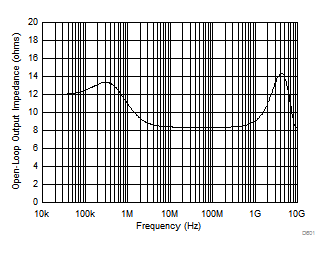JAJSG36 September 2018 OPA859
PRODUCTION DATA.
- 1 特長
- 2 アプリケーション
- 3 概要
- 4 改訂履歴
- 5 Device Comparison Table
- 6 Pin Configuration and Functions
- 7 Specifications
- 8 Parameter Measurement Information
- 9 Detailed Description
- 10Application and Implementation
- 11Power Supply Recommendations
- 12Layout
- 13デバイスおよびドキュメントのサポート
- 14メカニカル、パッケージ、および注文情報
パッケージ・オプション
メカニカル・データ(パッケージ|ピン)
- DSG|8
サーマルパッド・メカニカル・データ
- DSG|8
発注情報
9.3.4 Slew Rate and Output Stage
In addition to wide bandwidth, the OPA859 features a high slew rate of 1150 V/µs. The slew rate is a critical parameter in high-speed pulse applications with narrow sub-10-ns pulses, such as optical time-domain reflectometry (OTDR) and LIDAR. The high slew rate of the OPA859 implies that the device accurately reproduces a 2-V, sub-ns pulse edge, as seen in Figure 20. The wide bandwidth and slew rate of the OPA859 make it an excellent amplifier for high-speed signal-chain front ends.
Figure 53 shows the open-loop output impedance of the OPA859 as a function of frequency. To achieve high slew rates and low output impedance across frequency, the output swing of the OPA859 is limited to approximately 3 V. The OPA859 is typically used in conjunction with high-speed pipeline ADCs and flash ADCs that have limited input ranges. Therefore, the OPA859 output swing range coupled with the class-leading voltage noise specification for a CMOS amplifier maximizes the overall dynamic range of the signal chain.
 Figure 53. Open-Loop Output Impedance (ZOL) vs Frequency
Figure 53. Open-Loop Output Impedance (ZOL) vs Frequency